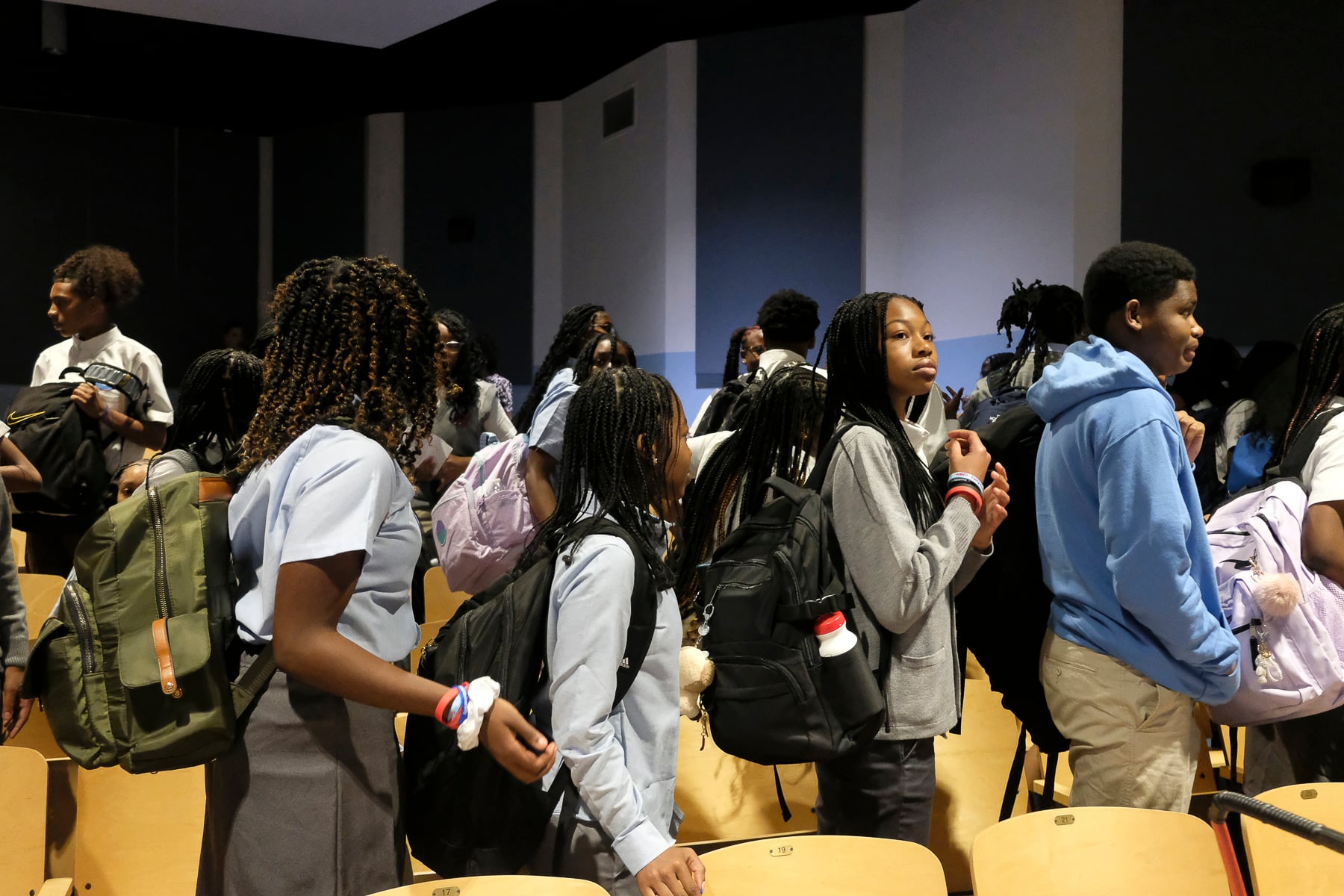Sign up for Chalkbeat New York’s free daily newsletter to get essential news about NYC’s public schools delivered to your inbox.
Students at the Queens High School for the Sciences have been calling on the city to move their school to a new building, citing problems with overcrowding, lack of a kitchen and auditorium, and other challenges sharing a facility with York College.
The school, which is the borough’s only specialized high school, is housed on the second floor of York College’s Jamaica building. That arrangement isn’t working for the school’s roughly 500 students, students and families said.
“We have a gym shared with a college that’s two blocks away, for 514 students. We have a library that’s also shared, even though it’s critical for our educational content and classes,” sophomore Vinny Dong told the Panel for Educational Policy, the school board that weighs in on school location proposals, in October.
Since last school year, families and students from the high school have been ramping up a campaign to move into a new school building the city is constructing at 165-15 88th Ave., about a 20-minute walk away. The move would allow the school to expand to 800 students, said Al Suhu, president of District 26’s Community Education Council.
At least three of seven parent boards in the borough, along with the citywide high school parent council, issued recent resolutions supporting the High School for the Sciences’ move or supporting the creation of a new specialized high school altogether.
The Queens High School for the Sciences isn’t the only one eyeing the building.
Parents at HBCU Early College Prep, a highly selective school that opened in September, have also asked to move into the new building, said Allen Williams, the president of District 29’s education council in southwest Queens.
Though the new building sits in District 28, it’s not far from the border of District 29.
Like the Queens High School for the Sciences, the HBCU is also about a 20-minute walk away from it.
Roughly 100 ninth grade students are in the inaugural class at HBCU Early College, which currently shares a building in Hollis with I.S. 238, also known as The Susan B. Anthony Academy, and P.S. 9 Walter Reed School, a District 75 school for students with significant disabilities. The HBCU is expected to enroll roughly 470 students when it expands to 12th grade by fall 2028, Education Department officials said.
By the 2029-30 school year, all three schools on the campus are expected to total up to 1,311 students, according to a letter to I.S. 238 parents. Even so, the letter stated, the building will be less than 80% filled.
“I fully understand how some parents feel when they want their children to have an experience with their own building,” Williams said.
Both schools vying for the building are highly sought after and hard to get into. The HBCU Early College school partners with Delaware State University, a historically Black college, allowing students to earn college credits and graduate with an associate degree. It currently reserves up to 40% of its seats for District 29 residents, another 40% of seats for students from District 27 and 28, and the remaining 10% of seats for Queens residents. Students are admitted based on their seventh grade GPAs, a writing assessment, and a video.
The Queens High School for the Sciences, founded in 2002, admits students from across the city based solely on how they perform on the Specialized High School Admissions Test.
Only 3.2% of specialized high school seats are in Queens, but nearly a third of students who receive offers to the eight test-based specialized high schools are Queens residents, according to Education Department data cited by the education council resolutions.
That means the majority of Queens students commute to specialized high schools in other boroughs, traveling upwards of an hour to attend classes, according to one of the education council resolutions. Expanding the size of the Queens High School for the Sciences could reduce commute times for the borough’s students, said Suhu, of District 26.
The city’s Education Department has not confirmed which school will move into the building, but said families and communities will be able to provide feedback before decisions are made.
The issue is expected to come before the Panel for Educational Policy, in the spring, officials said.
Queens High School for the Sciences students have been lobbying for the move, writing letters to the Education Department and attending the Panel for Educational Policy’s meetings to complain about the conditions there. Schools Chancellor Melissa Aviles-Ramos said she plans to visit and inspect the high school.
“We’re exploring options,” Aviles-Ramos said at the November Panel for Educational Policy meeting, without explaining further.
The panel’s chairperson, Gregory Faulkner, said he will also be visiting the school on Dec.12 after sophomore Vinny addressed the panel twice about the school’s conditions.
The new school building is scheduled to be completed by the fall, according to the School Construction Authority’s quarterly reports.
Ananya Chetia is a reporting intern at Chalkbeat NY. Contact Ananya at achetia@chalkbeat.org.






